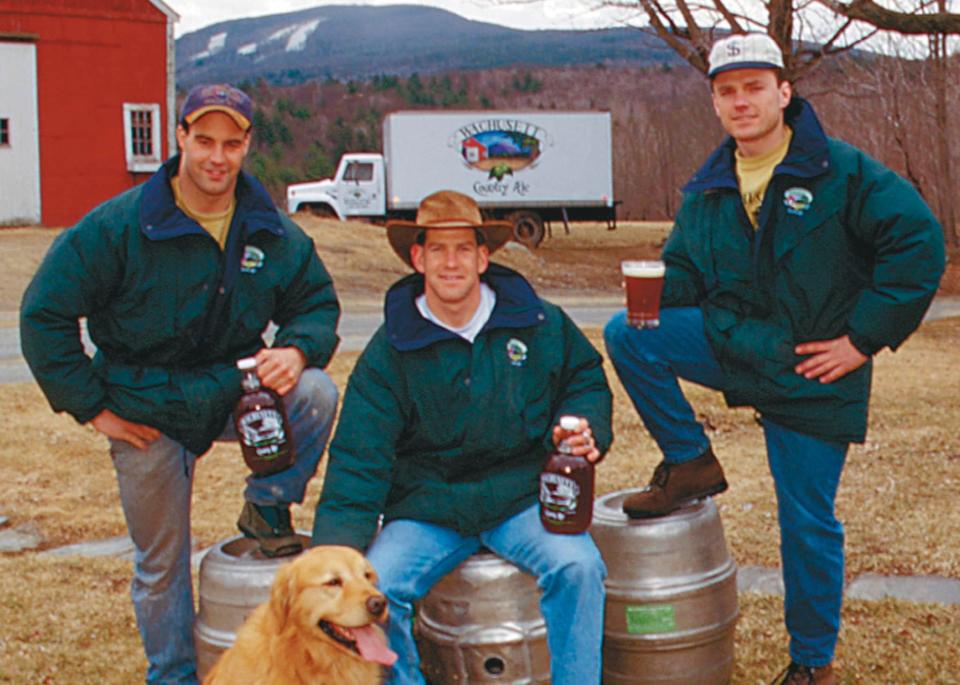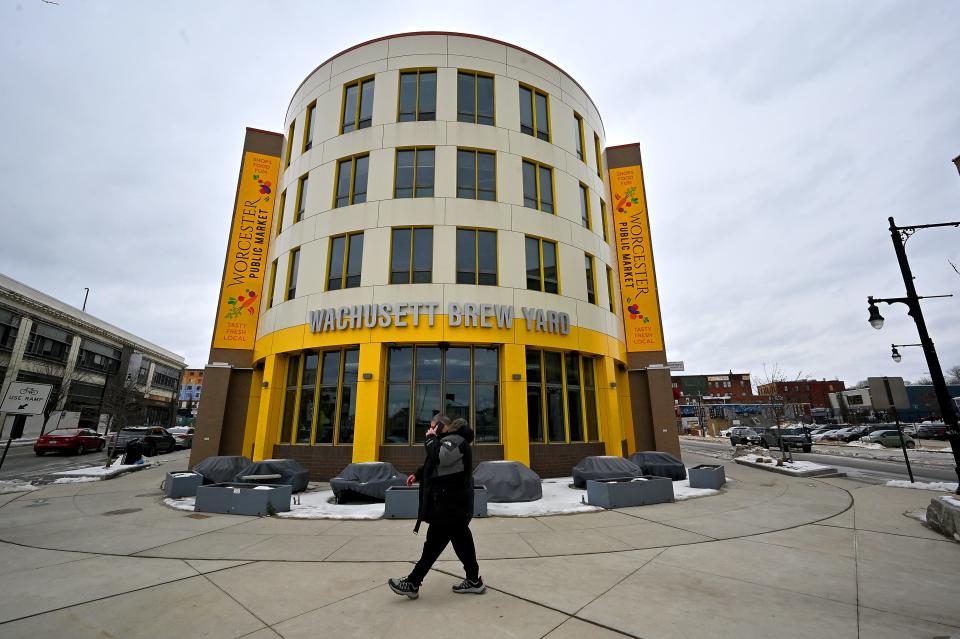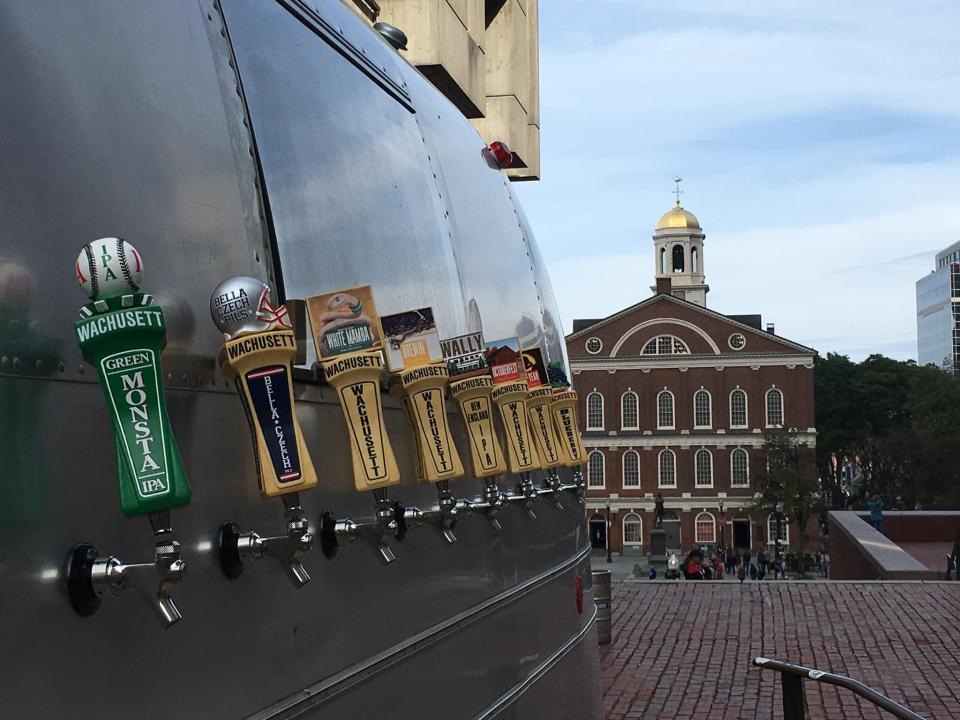Flip-flop of fortunes: Making sense of Wachusett’s sale to Smuttynose
A few years after Smuttynose Brewing Co. christened a new $24 million brewery, a contingent of Wachusett Brewing Co.’s brass drove up to Hampton, New Hampshire, to scrutinize the gleaming campus.

The start of a Granite State brewery tour this was not: Wachusett had ideas of buying Smuttynose.
The two breweries celebrated their 20th anniversaries in 2014 and trod similar paths in craft beer. But in 2017, they were barreling in different directions.
Embroiled in financial turmoil and facing foreclosure, Smuttynose went up for auction. Interest in its brand had waned after decades of growth, and production fell sharply. All of this coincided with Smuttynose’s investing millions into a massive brewery that now could not dream of reaching capacity.
Meanwhile, Wachusett had rounded into a brewing and packaging behemoth, equipped with one of the fastest canning lines in the country. The brewery had recently rolled out packs of two popular new hazy IPAs and expanded into hard seltzers, all while sprinkling in some brewing and packaging for other brewers, also called contract brewing.
Wachusett was well on its way to cracking the U.S. Brewers Association’s ranking of the 50 largest breweries in the country — brewing nearly 70,000 barrels of beer — and now eyed bringing Smuttynose’s legacy brand and state-of-the-art brewery into the fold.
Ultimately, though, Wachusett would pass on submitting a bid for Smuttynose.
Six years later, Smuttynose is the brewery on the rise. Wachusett faces the double-digit production declines, struggling to capture the same success in the retail market that it scrapped for during its early years.
And Smuttynose, not Wachusett, is the buyer.
On Jan. 17, Smuttynose’s parent company, Finestkind Brewing LLC, purchased Wachusett for an undisclosed amount. The draft lines at the Brew Yards in Westminster and Worcester will continue pouring, according to a report from the trade publication Brewbound, as many of those employees kept their jobs.
However, production of Wachusett’s beer — core brands like “Blueberry Ale” — will slowly shift to Hampton. Smuttynose has already begun auctioning off the majority of Wachusett’s brewing equipment. And while reports have had Wachusett touting its ability to save “90%” of the jobs at its brewery, the 10% of employees fired after the sale, I’m told, included all full-time employees with benefits, such as brewers, packagers and administrators.
I reached out to Smuttynose’s CEO Steve Kierstead, formerly its vice president of sales, several times last week for comment. He did not return my calls or emails.
John May, part of Wachusett’s ownership group, Blueberry Ale Inc., also did not return a call asking for comment on the sale.
Smuttynose and Wachusett brought in outside investors hoping to shore up their futures, so why was there such a dramatic flip-flop in fortunes?
Smuttynose’s investors led a turnaround to grow its production, incorporate new brands and expand its distribution.
Wachusett’s investors, a group run by Worcester-born entrepreneur Brett Williams, doubled down on the brewery’s contract brewing operation, most notably for the Long Island brewery Montauk Brewing Co.

The group arrived amid a flurry of activity at Wachusett. There had been new beers and seltzers and, for the first time in its history, the brewery embraced the taproom model, opening its Brew Yards. That momentum weakened during the pandemic and then eventually dissolved.
According to interviews with former Wachusett employees and current retail customers, Wachusett’s new owners didn’t connect with the 29-year-old brewery’s grassroots identity during the over three years they guided it.
“I don’t think they realized what our identity was, and little by little they started to get rid of our identity,” said T.J. Morse, Wachusett’s former director of sales, who spent close to 20 years at the brewery.
Changes at the top
Williams bought a stake in Wachusett in September 2020, a tumultuous time for the brewery. The pandemic had hampered Wachusett’s Brew Yards in Cambridge, Westminster and Worcester. Its retail and restaurant sales had suffered amid the lockdowns.
Still Wachusett stayed afloat, and its leadership team deferred their salaries to preserve jobs.
Williams and Ned LaFortune, Wachusett’s sole remaining founder, grew up together in Westminster. Before investing in Wachusett, Williams had played a critical role in fostering the partnership with Montauk Brewing Co., which he had also invested in.
The Williams group, after taking the reins of Wachusett, hoped to grow the contract brewing side of the business — one the brewery had begun in 2012 when it bought a canning line — by adding more contract brewing partners.
Over time, the Montauk deal would pull resources away from other Wachusett brands, said Dave Higgins, Wachusett’s former head brewer. Wachusett, at one point in the partnership, brewed some 50,000 barrels for Montauk.

Montauk had been growing faster than Wachusett and later moved on — bought by another company — leaving Wachusett without its biggest contract customer.
“When they went to that model, they put all their eggs in the Montauk basket,” said Higgins, who left the brewery after 17 years shortly after the Williams group came on. “It kept everyone busy. We had to work overtime to keep Montauk products out there. Once Montauk left, it exposed Wachusett to what it was: a brand that had been dwindling. The Montauk numbers saved it.”
In 2021, 2022, and 2023, Wachusett’s production dropped by 12%, 14% and 22%, respectively, according to the Brewers Association. And in 2021, the brewery quietly closed its Brew Yard in Cambridge.
Williams ushered in other changes, according to Morse, Wachusett’s longtime director of sales, like parting ways with some of the more influential voices on the brewery’s leadership team.
The leaders removed from Wachusett included Brad Dufour, Wachusett’s director of operations and its MacGyver executive engineer who joined the brewery in 2012; and Christian McMahan, who took over as president in 2017 and oversaw key improvements, new beers and product lines, and opened the Brew Yards.
Morse, who’d been with the brewery since 2006, was fired, too. He had been Wachusett’s point person for its wholesalers and its oldest retail accounts.
“The Williams group is made up of brilliant businessmen; the guy has turned breweries over left and right. You can’t deny his brilliance,” Morse said. “The problem is, with Wachusett, that was never our identity. We were grassroots.”
In the end, even LaFortune lost his influence.
In June, Wachusett terminated his contract and got an order barring him from the brewery he helped build.
A diminished local presence
To its retail customers, Wachusett’s leaders always had a face.
“The owners were all local guys,” said Chris Pompei, whose family has run Wyman's Liquors in Leominster and Fitchburg for 52 years. “They were around. They did tastings and events. You had them everywhere, all the time. They were around to help when you needed.”
Wyman’s has sold Wachusett beer for decades, and its founder, Pat Wyman, used to offer marketing tips to LaFortune, according to a 2014 Massachusetts Beverage Business story.
In recent years, its three stores have sold around the same amount of Wachusett, Pompei told me, yet the local connection seems to have frayed.
He could not remember specifically meeting Williams, for example.
“I do think, as all the original guys moved away from the company, the direction and focus of their resources seemed to change,” he said.
Wachusett’s legacy and future
I didn’t get a chance to talk to LaFortune on the record about his brewery; he has been out of the country. But I know he would agree that, aside from being the oldest brewery in Central Massachusetts, Wachusett was the scrappiest.
LaFortune and his fellow founders Peter Quinn and Kevin Buckler used their backgrounds as engineers to cobble together their first brewhouse by reusing old equipment, like a discontinued shrimp steaming kettle from Louisiana.
Unable to afford a lawyer, they incorporated Wachusett themselves in 1993.
After they brought in a new $1 million canning line, they had it disassembled and rebuilt, just so they knew how to fix it should it ever break down.
“Those guys were so hands-on,” Morse said. “It’s probably one of the only reasons we succeeded for so long.”
Wachusett survived massive changes in craft beer and the bust years of the early 2000s, when about half of the craft brewers in Massachusetts who opened in the 1990s shuttered.
Now Wachusett must survive new ownership, in a new state, without the three engineers who kept it taped together.
The pressure is on Smuttynose to keep a piece of Massachusetts craft beer history alive.
“I hope they preserve everything that every single person that’s worked one hour for that brand accomplished,” Higgins said. “It’s an iconic brand and a mainstay for that part of Massachusetts. Everybody knew that brand. We were in Fenway Park one year, having a big party there for ‘Green Monsta IPA.’ I hope it doesn’t go by the wayside. God, I hope they preserve it.”
This article originally appeared on Telegram & Gazette: Making sense of Wachusett Brewing’s sale to Smuttynose Brewing Co.

